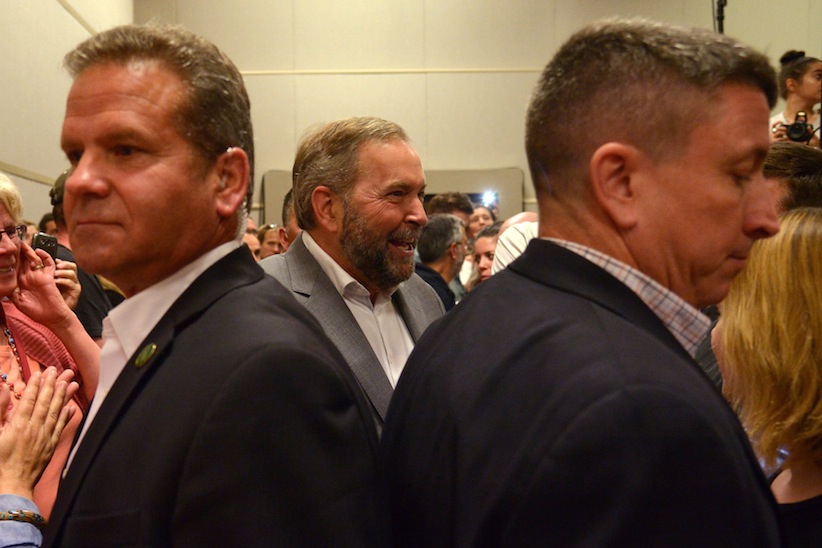Abacus Data poll: Mulcair’s mystery is a double-edged sword
As part of a wide-ranging poll about the leaders’ images, Abacus Data finds ‘both vulnerability and potential’ in the NDP leader’s numbers
Tom Mulcair, leader of Canada’s main opposition New Democratic Party, speaks during an interview in New York, U.S. During a visit to Washington this week Mulcair told U.S. lawmakers and executives that he opposes the Keystone XL oil pipeline, according to the Edmonton Journal. (Peter Foley/Bloomberg/Getty)
Share

To many Canadians trying to make up their minds in the federal election campaign, the NDP’s Thomas Mulcair still remains by far the least familiar of the three main party leaders, and yet, that hasn’t seemed to hamper him much in persuading a wide swath of voters to think of him as a plausible prime minister.
An exclusive online opinion survey by Abacus Data for Maclean’s probed what voters were thinking about a month into the campaign, and discovered an almost paradoxical mix of lingering uncertainty about who Mulcair really is, and a growing comfort with his leadership attributes.
Related: Read the previous Abacus poll: Race tightens as NDP support slips
Not surprisingly, Stephen Harper is the most familiar leader, with 82 per cent of respondents saying they think they have a very good, or, at least, pretty good, idea about the man who has been Prime Minister since 2006. When it comes to Liberal Leader Justin Trudeau (running for PM for the first time, but a famous figure since his much-photographed childhood as Pierre Trudeau’s eldest son), 66 per cent feel they know him very, or, at least, pretty well.
But only 54 per cent feel that level of familiarity about Mulcair. “It suggests both vulnerability and potential,” says Abacus CEO David Coletto. The risk is that the other parties will finally find a way to exploit that uncertainty to define Mulcair on their terms; the opportunity for the NDP is that there’s still a chance to present Mulcair to undecided voters they way they want him to be seen.
The Abacus findings suggest that, so far this year, voters are mostly feeling better about Mulcair, as they see more of him. The firm asked a set of questions about leadership impressions last January, then posed them again in August to see how the three rivals’ images are evolving. Mulcair’s persona tended to show the most improvement.
Slideshow: The lighter side of the Abacus poll
[rdm-gallery id=’533′]
For instance, when asked which leader would be the best CEO of a large company, Harper was chosen by 44 per cent in late August, down from 47 per cent last January, while Trudeau’s best-CEO rating fell six points to 17 per cent. The number of those surveyed who saw Mulcair—leader of a party traditionally at odds with business—as the best CEO rose nine points to 39 per cent. “He is clearly seen as competent,” Coletto concludes. “People have a comfort level with him, even though their understanding of who he is and where he’s coming from isn’t as great as the two other leaders.”
Beyond Mulcair’s leadership image, there’s the matter of the NDP looking like a fully competitive contender to win its first-ever federal election. Abacus polling released earlier this week found the three-way race is extraordinarily tight, with the NDP at 31 per cent, the Conservatives at 30 per cent, and the Liberals at 28 per cent.
So Abacus asked its respondents to agree or disagree with this statement: “Since there has never been an NDP federal government before, I worry about what the NDP will do if elected this time.” Overall, 46 per cent said they were worried, while 40 per cent were not worried, and 14 per cent were unsure.
[widgets_on_pages id=”Election”]
You might imagine that those 46 per cent who agreed they are worried are not voting NDP. But Abacus found, to the contrary, that 21 per cent of declared NDP supporters are at least somewhat worried about what the party they’re backing will do if it actually wins on Oct. 19.
In fact, the firm found the same mixed feelings among some NDP voters regarding last spring’s breakthrough win for the party in Alberta’s provincial election, when a substantial minority of NDP voters also admitted they did so with some misgivings.
“People were so sick and tired of the Progressive Conservatives in Alberta that they were willing to roll the dice on change,” Coletto says. “That’s where some (federal) New Democrat supporters are: ‘The NDP change is not perfect, I’m not sure what they are going to do, because they have never been in government, but—you know what?—I’m willing to take that risk.’ ”
About the poll
The Abacus survey was commissioned by Maclean’s and conducted online Aug. 26-28, with 1,500 Canadians aged 18 and over. A random sample of panelists was invited to complete the survey from a large representative panel of more than 500,000 Canadians. The Marketing Research and Intelligence Association policy limits statements about margins of sampling error for most online surveys. The margin of error for a comparable probability-based random sample of the same size is +/- 2.6 per cent, 19 times out of 20. The data were weighted according to census data to ensure that the sample matched Canada’s population according to age, gender, educational attainment and region.